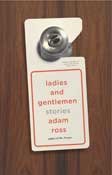Adam Ross' "Ladies and Gentlemen" (Knopf, 2011, $26) is a collection of short stories that tell of an indifferent universe and untrustworthy companions who carelessly toss around the nervous men of Ross' stories. In "When in Rome," Caleb, the narrator, talks about a story he'd heard about his father and uncle—how, when they were young, they had gotten caught in the ocean's undertow and slammed against a coral reef. His uncle persuaded his father to keep fighting the current, not because he thought there was a chance he'd overcome it, but because he found it so amusing to watch the water overpower him every time he tried.
Ross understands what it means to love people, to have them betray you and to keep loving them anyway—not because you're a better person or because you're a martyr, but because you have decided, on some level, that the tide knows better than the swimmer.
Keep in mind two important things about this way of dealing with the world: It's profoundly unhealthy, and it makes for some really interesting stories. All of Ross' characters are, to a greater or lesser extent, suckers—weakened, compromised or destroyed outright by their willingness to exercise the wrong kind of patience, to put themselves in harmful positions, to love without any expectation of reciprocity. But they also, I suspect, represent Ross' idea of what it means to be masculine in the United States of 2011 where, in the words of feminist writer Betty Friedan, there are "no more bears to kill."
The gentlemen of "Ladies and Gentlemen"—none of the viewpoint characters are women—are not especially gentle, but they are most certainly men, having achieved a kind of patient, stiff-upper-lip masculinity that is rooted in the ability to endure pain without complaint.



Comments
Use the comment form below to begin a discussion about this content.
comments powered by Disqus